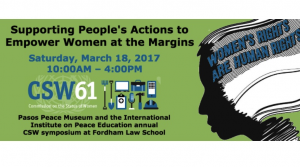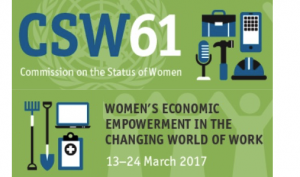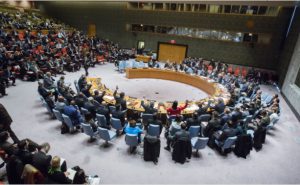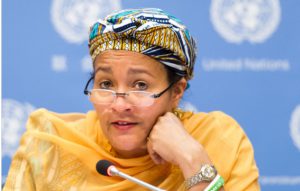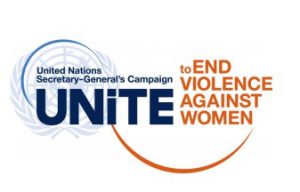. WOMEN’S EQUALITY .
A report by UN Women
Chair of the Commission on the Status of Women, H.E. Mr. Antonio de Aguiar Patriota, Secretary-General of the UN, President of ECOSOC, President of the General Assembly, Ministers and representatives from capitals, Women and civil society representatives,
At the outset, I would like to thank the Chair of CSW, his Excellency Ambassador Patriota, and his Bureau, for all their work in preparing this complex event.
I also want to thank the UN Women team across the world for their hard work and preparations, including the important regional pre-CSW consultations that allow us all to get together in this session and be as ready as we are.
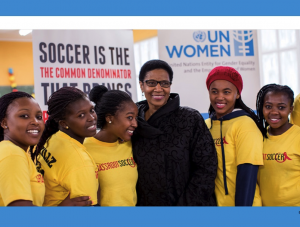
In Cape Town, South Africa, UN Women Executive Director Phumzile Mlambo-Ngcuka meets girls involved in the Grassroots Soccer SKILLZ programme, a grantee of the UN Trust Fund to End Violence against Women. Photo: Karin Shermbrucker
Click on the image to enlarge
A special thanks to the representatives of Member States, civil society and youth who have travelled from all over the world to collaborate with us. And I thank Member States for their inclusion of civil society and youth in their delegations, helping to make this meeting truly universal in its deliberations.
There are 750 young people here who on Saturday and Sunday were engaged in an assembly and a festival of ideas. What an engagement that was! We also have 8,600 pre-registrations, which means that we potentially have the largest number ever of civil society representatives with us in this CSW61.
I would also like to acknowledge our Secretary-General, at his first Commission in his new capacity. Secretary-General, it is wonderful to have you with us here. I thank him for leading the agenda on gender equality from the front and for his insightful remarks and unwavering drive to tackle gender inequality from Day One of his tenure.
This Commission concerns itself with the status of women. It reviews the progress made by women and girls, and assesses the remaining challenges. It is a barometer of the progress we are making on achieving a world that is free of gender discrimination and inequality, a world that leaves no-one behind. It will help us measure achievement of the implementation of the 2030 Agenda for Sustainable Development. It also helps us to pursue action in priority areas and benefits from the Commission’s Agreed Conclusions.
The priority theme for CSW61, as set out in the Secretary-General’s report for the session, is “Women’s Economic Empowerment in the Changing World of Work”. Inclusive economies and a positive world of work are powerful ways of breaking away from the cycles of poverty that besiege our nations.
Currently, in the gender equality agenda, we see progress in some areas, but we also see an erosion of gains. The much-needed positive developments are not happening fast enough. We also need to work together to make sure we reach a tipping point in the numbers of lives changed.
We need swift and decisive action that can be brought about by the world of work so that we do not leave women even further behind.
Excellencies, let us agree to constructive impatience.
(continued in right column)
Does the UN advance equality for women?
(continued from left column)
The Sustainable Development Goals give us a framework to work for far-reaching changes. In this session of the Commission we will be able to bring renewed focus to the needs of those who are currently being left behind and those who are currently furthest behind.
They include young women; some of whom were at the Youth CSW. They include refugees and migrants. They include women affected by gender-based violence, including workplace sexual harassment.
They include women who are denied sexual and reproductive health and reproductive rights and services; and women facing discrimination on multiple and intersecting fronts over and above their gender: such as sexual orientation, disability, older age, race, or being part of an indigenous community.
They include women in the informal sector, and care givers, those who provide services in the home that are much needed to sustain society.
Almost all women do some form of work. If you are a woman you are a worker—period.
Virtually all economies rely on the unpaid care and domestic work that is largely provided by women and girls. Yet this form of work positions masses of women uniquely to be “left behind”.
Positive changes in the world of work must enable care work to be valued and to be shared by parents and within the family unit. This will bring about far-reaching positive changes for women, society and economies.
Investment into the care economy of 2 per cent of GDP in just seven countries could create over 21 million jobs. That would provide child care, elderly care and many other needed services.
The Secretary-General’s report gives greater attention to women who work at the base of the pyramid, as these are the ones who are at the highest risk of being left behind.
The Commission must also look at how to increase the participation of these women, as well as women’s participation in male-dominated sectors that have meaningful economic benefits.
The Commission can make fresh gains in how we bring the informal sector into a structured and meaningful economic relationship with benefits, respecting the rights of women in this sector.
The informal sector is dominated by the millions and millions of women who are the working poor. Women workers in the informal sector are all around us.
They are in the rapidly growing urban communities, as well as in rural areas. They are the under-the radar and under-valued cogs in the bigger wheels of the formal economy. They are the low-cost farm workers, flower sellers, street food vendors, care workers, and home-based producers of garments and car parts. Almost none of them have legal or social protection.
And they are missing out on the opportunities offered by the changing world of work, which has technology as one of its advantages…
[Editor’s note: We found it too difficult to abbreviate this speech into the usual length for a CPNN article without losing important statements; hence it is continued on the following page.]
